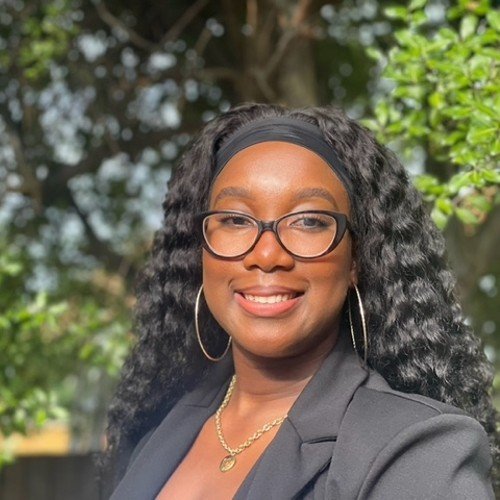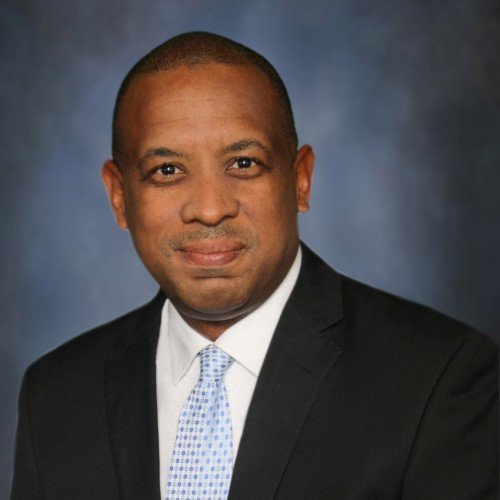To conclude Black History Month 2022, we have asked a varied group of Oxford Brookes alumni, all of whom are black, for their perspectives and thoughts on mental health and wellness.
Evelkah Powell moved from Anguilla to the United Kingdom when she was still at school. She is now working as a Diversity, Equality and Inclusion Specialist, which she describes as her “dream job”, but bad experiences in the past seriously impacted her mental health.

Fitting into British society, as a young black woman, was a challenge from day one, as Evelkah explains, “Pretty much everybody in Anguilla shares the same cultural identity. When I moved to the UK, it was the first time I became more aware of my black identity and so I felt I had to change – change my hairstyle, change the way I spoke in order to fit in.”
But it was less obvious issues, microaggressions stemming from all too widely held stereotypes about black women, that caused Evelkah the most mental anguish.
“I can recall during one meeting, I was laying out the action plan and catching up with those within the team. A couple of days later, my manager contacted me to say someone within my team had reported that they don’t like my tone of voice.
“Everything seemed to be going fine so I was quite shocked. They reported it to HR, so they had to get involved.
“I was very conscious of the stereotypes of black women being too loud or too aggressive. It made me realise that these views are very much alive and are still happening. As much as you might think they don’t happen, they do whether you realise it or not.
“When such behaviour occurs, they make you question and doubt yourself. I started to feel a lot more anxious to the point where I’d try so hard to be the ‘better’ person, so I couldn’t be painted with those stereotypes. Sadly, it led me to burnout and soon after I had a mental breakdown.”
Derogatory stereotypes and subconscious biases, of the sort Evelkah faced, are a day-to-day burden on the mental health of black people in the UK. This social problem contrasts with the situation in Trinidad and Tobago, an ethnically mixed country with no ‘majority’ group.
Jonathan Cumberbatch, Assistant Vice President, Human Resources & Administration at the University of Trinidad and Tobago (UTT), explains, “The population of Trinidad and Tobago is estimated to be 1.4 million. Of that total, approximately 37% are classified as ‘African’, 37% ‘Indian’ and 24% are classified as being of ‘Mixed’ descent. Based on our local census data, this third group continues to grow most rapidly and may well overtake the other two groups within the next 20 - 30 years.

“There is a historic awareness of racial and cultural differences between the Indo and Afro groups and exchanges remain largely positive.
“While one does observe an increased social tension during election cycles, exacerbated by the advent of social media, such negativity has historically not translated into overtly oppressive or physically aggressive behaviour in the wider society.”
Nonetheless, as in most countries, mental health issues are increasing in Trinidad and Tobago, and Jonathan is aware of the need to ensure effective support at the University.
“Universities are no different to any other employer group, and best practices developed in other sectors can often be adopted within the education sector. A lot of my efforts at the UTT have been to remove vagary in work processes and establish work KPIs and objectives where applicable. Employee, and student, mental health and wellness is identified as a priority issue.
“Based on applicable WHO statistics, and general feedback from professional colleagues, there has been a general local increase in cases regarding burnout, domestic distress and general stress. At the University, in anticipation of any similar circumstances, we have pro-actively implemented a formal Employment Assistance Programme, along with the circulation of best practice wellness recommendations. We believe that such consistently supplied advice, and institutional tools, can be positively applied and adopted to everyday lives.”
Stephen Iheanacho studied for a PhD at a university in New Zealand and faced serious mental health challenges in his final year.
He has no doubt that being black made it harder for him to access informal support, “Agitations easily build up as soon as the black student feels he/she is by themselves. That feeling opens the gateway for thoughts that escalate into depression depending on the student’s ability to share those thoughts with a third party. Black students are most likely to be in the minority with fewer networks with the black community which makes them more likely to feel this way.”
Hilary Frank also suffered mental health issues whilst studying for a PhD. His problems were triggered by Covid, “Access to important University resources for my research were limited or completely absent. Vital research interactions like collaborations with colleagues, and conference attendance were really hampered. My learning curve dipped. Then my general wellbeing and mental state became heavily impacted.”
For Hilary, thankfully, his university’s wellbeing service was there to help. His experience demonstrated just how important the effectiveness of these services is for students and universities as a whole.
He says, “The mental health and wellbeing of members, and particularly disadvantaged members, is essential to a thriving academic environment. As someone who has benefited from university mental health and wellbeing support services, I advocate that universities should consider the provision of these services as important as the teaching and learning they provide. This is an enabler for a full integration of all members of the university community and an opportunity to derive maximum benefit from the potential contributions of all.”
Stephen’s opinion chimes with this and he also advocates greater emphasis on enabling informal, peer-to-peer support, “Student’s welfare is every employee of the university’s business and not just the business of the Student Affairs department and Student association. Create, support and promote forums and avenues where black students can meet with other students of colour for support and networking.”
Talking with supportive people as an important step in addressing mental health issues is a recurring theme from our contributors. For Evelkah, seeking help from both friends and professionals was key.
“I was digging myself into a hole and the most important thing in helping me see myself out of it was having positive people around me – friends and family, but also in the workplace. Without them I’d probably have kept on believing the negative comments and assumptions about me.
“I have a therapist and I’m proud I have a therapist! They’ve helped me see myself for who I really am and what my mission is.”
Jonathan also supports the idea that both informal and professional support can be important, “I believe social activity is the most essential aspect of mitigating mental health issues. Conversational counselling can provide the structure and tools for people to get out of the rut they’re in.”
Exercise is also a valuable tool. In Trinidad and Tobago, blessed with a warm climate, this can often be combined with getting outside and closer to nature. In the UK that isn’t always so practical but a change of scene can still be beneficial.
Evelkah explains, ““Exercise is a big thing. Moving myself out of my normal space really helps, so as soon as I step into the gym everything else just goes away. I can get so laser focused on the exercise that I forget what I was thinking or worrying about before.”
The variety of experiences and perspectives presented here demonstrates that while mental health issues often have complex causes, there are a number of good practices and processes to mitigate them – both at individual and institutional levels. It is also very clear that, in the UK at least, these issues continue to disproportionately affect people with ethnic minority backgrounds and that is an injustice that the whole of society needs to address.
Thank you to our contributors for their valuable insights and honesty.
